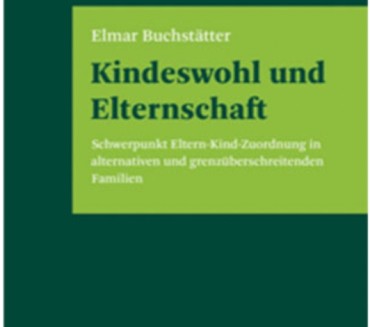Book Review
The book under review, titled “Kindeswohl und Elternschaft: Schwerpunkt Eltern-Kind-Zuordnung in alternativen und grenzüberschreitenden Familien” (translated as “The Best Interests of the Child and Parenthood: Parent-Child Assignment in Alternative and Cross-Border Families”) by Dr. Elmar Buchstaetter, is written in German. It is based on the author's dissertation thesis at Paris Lodron University Salzburg, Austria and was published by esteemed Jan Sramek Verlag, Vienna, 2023, 236 pages, ISBN: 978-3-7097-0345-8.[1]
In his research, Dr. Elmar Buchstaetter goes beyond merely defining and structuring the concept of the best interests of the child. He explores the topic within the wider framework of family dynamics, parenthood, and other aspects of family law. The book places significant emphasis on analysing the ECHR as well as the case law of the ECtHR. Moreover, it provides a detailed comparative review of Austrian, German and Swiss case law.
The author clarifies at the outset that the purpose of his work is not to ascribe new ethical-philosophical meanings to existing laws or to reclassify norms in a dogmatic way. Instead, the aim is to delineate the substantive dimensions of the best interests of the child principle across various methods in establishing legal parenthood, balancing the rights and duties of adults and children.
The first chapter examines the structural differences between registered partnerships and civil marriage as well as the impact of advancing gender equality on these legal institutions. The increasing societal relevance of informal partnerships is addressed along with the various functions of the family. The second chapter questions the position of children in Austrian family law before it turns to the legal assignment of children to legally recognised family models. A primary objective of this chapter is to systematically capture relevant norms for further comparative analysis. The book's further structure follows the legal significance of the methods for establishing legal parent-child relationships: from the law of descent through adoption and foster care to de facto adult-child relationships. The book’s main focus, however, is on the legal assignment of children in cases where the biological or genetic parenthood of one or both parents diverges, as well as on the legal and ethical issues of current reproductive medicine. In this area, cross-border proceedings are increasing, raising difficult questions about the conflict of laws and recognition of foreign decisions on parenthood.
The key research findings are as follows:
- When registered partnerships were introduced as a second form of legal adult relationships alongside civil marriage in 2010, the regulations were restrained: They granted same-sex couples a certain legal status but did not aim for equality with marriage concerning legal parenthood. Eventually, however, following the case law of the ECtHR and the Austrian Constitutional Court, a significant equalisation of marriage and registered partnership could be achieved. With the opening of marriage to same-sex partners, the registered partnership was also made accessible to different-sex partners, aiming to ensure some equality between the two legal institutions. Despite their increasing societal relevance, informal partnerships still have an overall significantly weaker legal position than marriage.
- The best interests of the child are a guiding principle in family law and must be considered in all questions regarding the establishment of parenthood. This is especially crucial for same-sex parents who wish to undergo medically assisted reproduction, whether at home or abroad. Balancing the parents’ interests with the child’s best interests is indispensable.
- Access to legal parenthood still strongly depends on the underlying adult relationship of the intended parents. Especially when utilising reproductive techniques prohibited by foreign national law, the recognition of the child’s legal status is problematic. In such cases, the type of foreign decision determines whether legal parenthood by descent is recognised or if the genetically unrelated parent is referred to adoption. Comparative law reveals differing perspectives among Central European supreme courts on this issue.
The entire work is not only intriguing and well-written but also shows a high quality of reasoning through in-depth analyses and well-founded conclusions. For these reasons, Dr. Elmar Buchstaetter’s book is strongly recommended for family law experts as well as anyone interested in family relations.
[1] Elmar Buchstaetter. Kindeswohl und Elternschaft: Schwerpunkt Eltern-Kind-Zuordnung in alternativen und grenzüberschreitenden Familien (Jan Sramek Verlag 2023).

